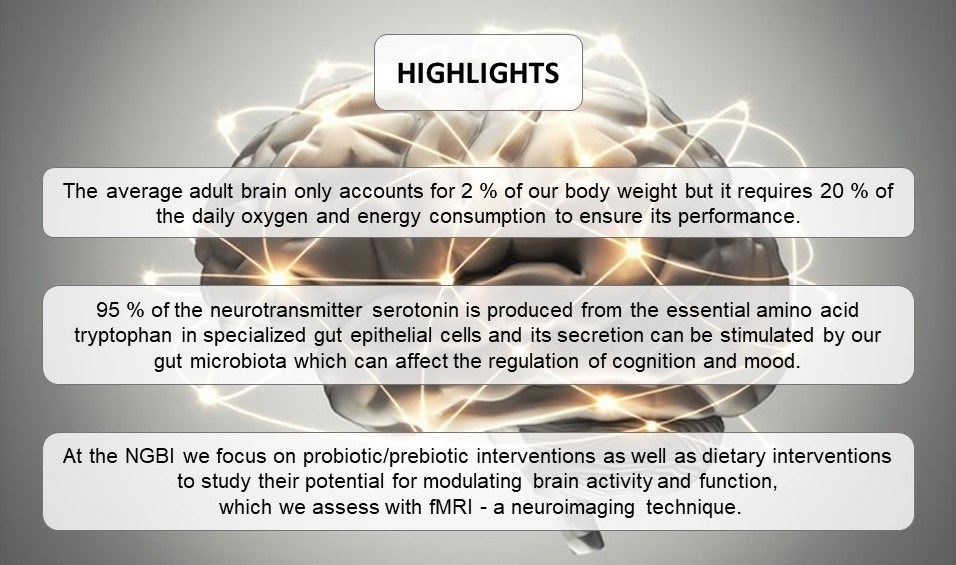Brain
Even though the average adult brain only accounts for 2 % of our body weight, it requires 20 % of the daily oxygen and energy consumption to perform its function in crucial tasks such as decision making, problem solving, emotions and cognition, coordinating respiration and heartbeat and the processing of sensory information. The transport of information from the brain to the periphery and vice versa is ensured via electrical and chemical signals – latter are also known as neurotransmitters. They can pass the synapses – the gaps between neurons – and ensure in this way signal transmission throughout our body and the communication between neurons and cells (1).

For instance, 95 % of the neurotransmitter serotonin is produced from the essential amino acid tryptophan in specialized gut epithelial cells and its secretion can be stimulated by our gut microbiota. However, also GABA, norepinephrine, dopamine, acetylcholine, and melatonin are products of microbial processes, therefore, our gut microbiota could have an important role in the regulation of cognition and mood (2). Findings also suggest that intestinal microbes may be additionally involved in neurodevelopmental and neurodegenerative disorders by interacting with the gut’s own nervous sytem (3,4).
Another influencing factor on brain health and signal transmission is nutrition. Unsaturated fatty acids, such as omega-3 fatty acids, are needed for adequate brain development and can affect synaptic plasticity and cognition. The latter is also affected by a variety of different vitamins such as folate or Vitamin E (5). Dietary fat intake affects the composition of fatty acids in the brain (6). In the past, a poor diet was shown to be related to an increased risk for stroke, dementia, Parkinson’s disease, and mental health disorders such as depression, anxiety and schizophrenia (7).
Since there is an interconnection between nutrition, gut microbiota and brain – probiotics, prebiotics and dietary interventions are starting points to modulate brain activity and function (8).
At the NGBI we address these factors as well as their interaction in our research. Brain activity, for instance, can be measured with functional magnetic resonance imaging (fMRI) – a neuroimaging technique. The fMRI scanner can distinguish between active and inactive brain regions by detecting the differences in blood flow distribution and oxygenation (9). We have established a state-of-the-art fMRI scanner at Örebro University Hospital and Örebro University specifically dedicated for research purposes, which we have used in recent intervention studies. Our research has shown that the intake of probiotics altered brain responses in regions involved in emotional, cognitive and face processing in comparison to a placebo (10). We also plan to involve the fMRI in future studies on disturbances in the gut-brain axis by bridging gastrointestinal alterations with brain function and for instance neurodegenerative diseases.
- National Institutes of Health (US); Biological Sciences Curriculum Study. NIH Curriculum Supplement Series [Internet]. Bethesda (MD): National Institutes of Health (US); 2007. Information about the Brain. Available from: https://www.ncbi.nlm.nih.gov/books/NBK20367/
- Wei, L., Singh, R., & Ghoshal, U. C. (2022). Enterochromaffin Cells-Gut Microbiota Crosstalk: Underpinning the Symptoms, Pathogenesis, and Pharmacotherapy in Disorders of Gut-Brain Interaction. Journal of neurogastroenterology and motility, 28(3), 357–375. https://doi.org/10.5056/jnm22008
- Morais, L. H., Schreiber, H. L., 4th, & Mazmanian, S. K. (2021). The gut microbiota-brain axis in behaviour and brain disorders. Nature reviews. Microbiology, 19(4), 241–255. https://doi.org/10.1038/s41579-020-00460-0
- Lacorte, E., Gervasi, G., Bacigalupo, I., Vanacore, N., Raucci, U., & Parisi, P. (2019). A Systematic Review of the Microbiome in Children With Neurodevelopmental Disorders. Frontiers in neurology, 10, 727. https://doi.org/10.3389/fneur.2019.00727
- Gómez-Pinilla F. (2008). Brain foods: the effects of nutrients on brain function. Nature reviews. Neuroscience, 9(7), 568–578. https://doi.org/10.1038/nrn2421
- Dullemeijer, C., Zock, P. L., Coronel, R., Den Ruijter, H. M., Katan, M. B., Brummer, R. J., Kok, F. J., Beekman, J., & Brouwer, I. A. (2008). Differences in fatty acid composition between cerebral brain lobes in juvenile pigs after fish oil feeding. The British journal of nutrition, 100(4), 794–800. https://doi.org/10.1017/S0007114508943737
- Adan, R., Cirulli, F., Dye, L., Higgs, S., Aarts, K., van der Beek, E. M., Buitelaar, J. K., Destrebecq, F., De Witte, E., Hartmann, T., Korosi, A., Libuda, L., & Dickson, S. L. (2022). Towards new nutritional policies for brain health: A research perspective on future actions. Brain, behavior, and immunity, 105, 201–203. Advance online publication. https://doi.org/10.1016/j.bbi.2022.07.012
- Galland L. (2014). The gut microbiome and the brain. Journal of medicinal food, 17(12), 1261-1272. https://doi.org/10.1089/jmf.2014.7000
- https://www.ndcn.ox.ac.uk/divisions/fmrib/what-is-fmri/introduction-to-fmri
- Rode, J., Edebol Carlman, H., König, J., Repsilber, D., Hutchinson, A. N., Thunberg, P., Andersson, P., Persson, J., Kiselev, A., Lathrop Stern, L., Salomon, B., Mohammed, A. A., Labus, J. S., & Brummer, R. J. (2022). Probiotic Mixture Containing Lactobacillus helveticus, Bifidobacterium longum and Lactiplantibacillus plantarum Affects Brain Responses Toward an Emotional Task in Healthy Subjects: A Randomized Clinical Trial. Frontiers in nutrition, 9, 827182. https://doi.org/10.3389/fnut.2022.827182
